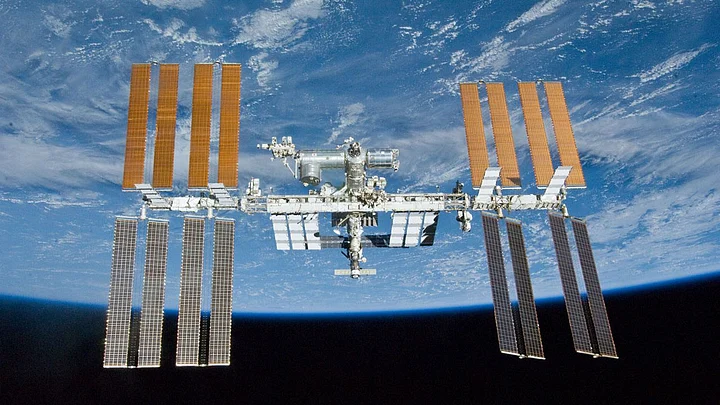In retaliation against the sanctions imposed on Russia over its Ukraine invasion, Russia said it will no longer supply rocket engines, manufactured by state-owned NPO Energomash, to the United States.
"In a situation like this we can't supply the United States with our world's best rocket engines. Let them fly on something else, their broomsticks, I don't know what," Dmitry Rogozin, head of the Russian space agency Roscosmos, said on Thursday, 3 March, Reuters reported.
Apart from withholding rocket engines, Russia is also threatening to sabotage other space partnerships including the ISS and collaborations with private companies.
Here's a breakdown:
No Rocket Engines for The US
Rogozin said that Roscosmos will also stop servicing rocket engines it had previously delivered to the US, leaving 24 engines without Russian technical assistance.
This will primarily affect two US companies, the United Launch Alliance (ULA) and Northrop Grumman.
ULA, a partnership between Boeing and Lockheed Martin, is a spacecraft launch service provider for NASA and the US Department of Defense. It manufactures and operates a number of rocket vehicles capable of launching spacecraft, including the Atlas V rockets, which use Russian engines.
Russia has reportedly delivered a total of 122 RD-180 engines to the US since the 1990s, after the collapse of the Soviet Union, of which 98 have been used to power Atlas launch vehicles.
According to ULA CEO Tory Bruno, the company already has all the Russian engines it needs for its rockets at the moment. It is also transitioning to a new launch vehicle, called the Vulcan Centaur, which will have an engine developed by Jeff Bezos' Blue Origin.
“We have agreements for technical support and spares, but if that support is not available, we will still be able to safely and successfully fly out our Atlas programme,” Jessica Rye, a ULA spokesperson told The Verge.
All things considered, ULA shouldn't be affected by Russia's move.
Northrop Grumman, an American aerospace and defense technology company, which regularly sends cargo to the International Space Station (ISS) for NASA, uses NPO Energomash’s RD-181 engine for its Antares rockets.
But this engine will no longer be available to the company, which could spell trouble for planned launches.
“There were plans to deliver an additional 12 RD-181 engines in 2022-2024 and talks were also held with the United States on the delivery of RD-181M engines with improved operational characteristics but we believe that in this situation we can no longer supply the United States with our best engines,” Rogozin told Russian news agency TASS.
According to NASA, Northrop Grumman has at least three more flights planned in 2022 and 2023.
'Want to Manage the ISS Yourself?'
Rogozin, on 24 February, implied that the sanctions would destroy Russia’s partnership with NASA and spell trouble for the International Space Station.
Without Russia, he said, there would be no one to correct the space station’s orbit, and the ISS could crash into the US, Europe, India, or China.
“If you block cooperation with us, who will save the ISS from an uncontrolled de-orbit and fall into the United States or Europe? There is also the option of dropping a 500-ton structure to India and China. Do you want to threaten them with such a prospect? The ISS does not fly over Russia, so all the risks are yours,” he wrote on Twitter.
He isn't entirely incorrect. The ISS is refueled and resupplied by Russian Progress MS rockets and it needs fuel to adjust its orientation and position in space, and keep itself in orbit around the Earth.
“If the Russians walk away, then you’ve got this massive object that’s going to come back in randomly somewhere over the Earth,” Wayne Hale, a member of NASA’s Advisory Council, told The Verge.
He said the scenario would take several years, giving NASA time to come up with an alternative solution.
However, for the time being, the ISS seems to be in no danger. Both Roscosmos and NASA have confirmed to the publication that their collaboration over the ISS will continue.
Other Broken Partnerships
Roscosmos also announced that it’s temporarily suspending Soyuz rocket launches in French Guiana due to sanctions imposed by the European Union. This will impact European launch provider Arianespace, which uses Soyuz rockets to launch satellites.
In a tweet it said, “Roscosmos is suspending cooperation with European partners in organising space launches from the Kourou Cosmodrome and withdrawing its personnel, including the consolidated launch crew, from French Guiana."
The space agency added that there are 87 Russian citizens in Guiana Space Center in Kourou and "the issue of the departure of Russian employees is being worked out".
Russia is also stalling internet company OneWeb's upcoming satellite launch onboard a Soyuz rocket from Afghanistan. It wants assurances that the company’s satellites will not be used for military purposes and that the British government will divest its stake in the company.
Kwasi Kwarteng, Britain’s secretary of state for business, energy, and industry strategy, said on Twitter that the British government won't sell its stake in OneWeb. The launch is unlikely to occur.
Rogozin, head of Roscosmos, also said that the US would be excluded from an upcoming joint mission to explore Venus, called Venera-D. “In the context of the introduction of new and the preservation of previously imposed sanctions, I consider the continued participation of the United States in the Russian project for the development and creation of an interplanetary station Venera-D inappropriate,” he said.
(With inputs from Reuters, TASS, and The Verge)
